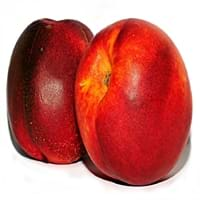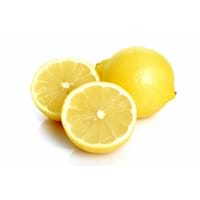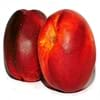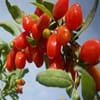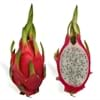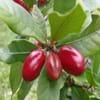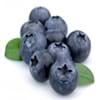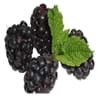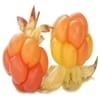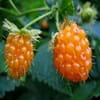Health Benefits
Cancer prevention, Heart care
Arthritis treatment, Asthma treatment, Cancer prevention, Kidney stone treatment, Prevents constipation, Purging blood, Treatment of rheumatism
General Benefits
Anti oxidant properties, Boosts immune system, Digestive aid, Eye care, Helps in weight loss, Maintains healthy cholesterol level
Boosts immune system, Cures headache, Cures fever, Digestive aid, Flu treatment, Maintains healthy cholesterol level, Treatment of common cold
Skin Benefits
Anti-aging benefits, Reduces wrinkles, Skin rejuvenation
Heals sunburn, Reduces wrinkles, Skin rejuvenation, Treatment of acne, Treatment of skin diseases
Hair Benefits
Protects hair
Prevents hair loss, Treatment of dandruff
Allergy Symptoms
Anaphylaxis, Asthma, Breathing difficulty, Diarrhea, Hives, Itching, Itchy eyes, Skin rash, Sneezing, Swelling of mouth, tongue or lips, Tingling sensation in mouth, Vomiting, Watery eyes, Wheezing
Eczema, Hives, Inflammation, Itching, Skin rash, Swelling
Side Effects
Allergic reaction, Headache, Nausea
Diuretic effects, Heart burn, Tooth decay, Chances of sunburn
Best Time to Eat
Best if taken as a breakfast (or empty stomach), As a snack in the late afternoon, Eat the fresh ones, avoid mixing with any other foods, don't eat after meal., Morning time (before lunch)
Along with meal, Best to drink lemon water on an empty stomach., Don't consume at night and before bed
Vitamin B5 (Pantothenic Acid)
Vitamin C (Ascorbic Acid)
Vitamin K (Phyllochinone)
Calories in Fresh Fruit with Peel
Not Available
Calories in Fresh Fruit without Peel
Not Available
Calories in Frozen Form
Not Available
Calories in Canned Form
Not Available
Type
Tree fruit
Citrus, Tree fruit
Season
Autumn, Summer
All seasons
Varieties
Arctic Jay, Artic Rose, Artic Star, Armking, Desert Dawn, Fairlane, Fantasia, Silver Lode, Snow Queen, Stanwick and Stark Sunglo
Avalon Lemon, Bears Lemon, Buddha's Hand, Bush Lemon, Citron, Eureka Lemon, Dorshapo Lemon, Finger Citron and Fino Citron
Color
Orange, Pink, Red, Yellow
Yellow, Yellowish-orange
Inside Color
Yellow
Yellow
Texture
Succulent
Succulent
Origin
China
China, India
Soil Type
Sandy loam
Well-drained
Climatic Conditions
Sunny, Warm
Hot, Sunny
Facts about
- The name ‘nectarine’ is with reference to the sweet food the gods eat, ‘nectar’.
- Nectarines are sometimes called ‘shaved peaches’ because their skin is smooth with no fuzz.
- Oil extracted from lemon peels is used for fingerboard of guitars.
- During Renaissance, ladies used lemons to redden their lips.
- Aroms of lemon decreases the level of stress hormones.
Spirits
Not Available
Yes
Other Countries
Argentina, Chile, Egypt, Greece, Iran, Italy, Spain, Turkey, United States of America
Argentina, Brazil, India, Iran, Italy, Mexico, Spain, Turkey, United States of America
Top Importer
Germany
United States of America
Top Exporter
Spain
Mexico
Botanical Name
Prunus persica
Citrus limon
Synonym
Not Available
Not Available
Subkingdom
Tracheobionta
Tracheobionta
Division
Magnoliophyta
Magnoliophyta
Class
Magnoliopsida
Magnoliopsida
Species
P. persica
C. limon
Generic Group
Rose
Citrus fruit
Difference Between Nectarine and Lemon
We might think that Nectarine and Lemon are similar with respect to nutritional value and health benefits. But the nutrient content of both fruits is different. Nectarine and Lemon Facts such as their taste, shape, color, and size are also distinct. The difference between Nectarine and Lemon is explained here.
The amount of calories in 100 gm of fresh Nectarine and Lemon with peel is 44.00 kcal and Not Available and the amount of calories without peel is Not Available and 29.00 kcal respectively. Thus, Nectarine and Lemon belong to Low Calorie Fruits and Low Calorie Fruits category.These fruits might or might not differ with respect to their scientific classification. The order of Nectarine and Lemon is Rosales and Sapindales respectively. Nectarine belongs to Rosaceae family and Lemon belongs to Rutaceae family. Nectarine belongs to Prunus genus of P. persica species and Lemon belongs to Citrus genus of C. limon species. Beings plants, both fruits belong to Plantae Kingdom.
